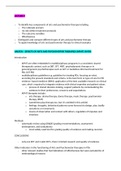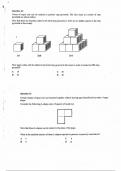LECTURE 9
o To identify key components of arts and psychomotor therapy including:
o The rationale and aim
o Its role within treatment protocols
o The outcome variables
o Effectiveness
o Distinguish and compare different types of arts and psychomotor therapy
o To apply knowledge of arts and psychomotor therapy to clinical examples
HAEYEN – EFFECTS OF ARTS AND PSYCHOMOTOR THERAPIES (APMT) IN PDS
Introduction
- APMT are often embedded in multidisciplinary programs in a consistent, shared
therapeutic context, such as DBT, SFT, MBT, psychodynamic therapy or in
general/generic psychotherapies such as ACT or Guideline-informed treatment for
PDs (GIT-PD)
- multidisciplinary guidelines e.g. guideline for treating PDs, focusing on what,
according the present standards and criteria, is the best form or type of care for PD
- evidence -based medicine (EBM): application of the best available research on clinical
care, what’s required to integrate evidence with clinical expertise and patient values
o process of shared decision-making, support patients by contextualizing the
evidence to their preferences, concerns and expectations
- APMT therapies include:
o arts therapy, drama therapy, dance therapy, music therapy, psychomotor
therapy (PMT)
o (sometimes play therapy too, but it’s omitted in this article)
o feelings, thoughts, behavioral patterns come forward via design, play, bodily
sensations or movements
o means of observation and contact with others, regulation of impulses and
emotions
Methods
- systematic review using GRADE (grading recommendations, assessment,
development, and evaluations)
o most widely used tool for grading quality of evidence and making recomm.
CONCLUSIONS
- only one RCT and 2 pilot RCTs, there’s limited research and quality of evidence
Other indicators in the functioning of Arts and Psychomotor therapies in PDs
- other relevant studies that had indications of effectiveness but were excluded bc of
methodological reasons
, - only some parts of the studies groups had PDs and not analyze separately
- Art therapy
o profit from art therapy scored sig. higher
o PD patients appreciate art therapy bc of the “as-if situation”, offers a safe
method to explore, express experiences and assign/mentalize them by art
o improvement in social functioning, attitude towards self, self-confidence
improved compared to TAU
- Drama therapy
o e.g. role switching, twinning, role-playing
o reduced stress and avoidance, self-esteem, conflict management, reality
check, develop empathy, positive self-image
o improvement in symptoms, interpersonal problems, depression, anxiety
- Music Therapy
o BPD patients report better perception, felt calmer, relaxed, more able to
enter new contacts
o effective for low-motivation
o patients with PDs more often use music to reduce neg. thoughts and achieve
relaxation than healthy subjects
o Musical attention control training effective in facilitating attention skills
o improved regulation of emotions and mitigating avoidance and passive coping
- Dance and movement Therapy:
o higher interpersonal functioning, more satisfaction with therapy and group
climate
o improvements on psy symptoms, body posture and movement, self-efficacy,
sleep, physical coping
o sig. dec. in depressive symptoms
o dance and movement therapy (DMT): self-regulation, interpersonal
relationships, integration of self, coping experiences, cognition and expression
and symbolization in movement/dance
inc. QOL and dec. clinical symptoms
- Psychomotor therapy (PMT)
o sig. improvements in aggressive behavior, social behavior and self-reported
anger
o pos. effect on mood, psy well-being, self-image, self-esteem and less
depression, anxiety and stress
o group therapy focused on bodily awareness and using experiential techniques
is more effective than psychodynamic group therapy to reduce problematic
functioning
o diff. relaxation methods in PMT: functional relaxation, progressive
relaxation, autogenic training, training in breathing, mindfulness
o PMT module of aggression: pos. effect on coping with anger
Contributions to observation, drawing up treatment indications and objectives
- observations of therapists can be important in confirming a diagnosis
- art therapists use e.g. Diagnostic and Drawing Series (DDS) uses objective
structure analysis of three drawings
o To identify key components of arts and psychomotor therapy including:
o The rationale and aim
o Its role within treatment protocols
o The outcome variables
o Effectiveness
o Distinguish and compare different types of arts and psychomotor therapy
o To apply knowledge of arts and psychomotor therapy to clinical examples
HAEYEN – EFFECTS OF ARTS AND PSYCHOMOTOR THERAPIES (APMT) IN PDS
Introduction
- APMT are often embedded in multidisciplinary programs in a consistent, shared
therapeutic context, such as DBT, SFT, MBT, psychodynamic therapy or in
general/generic psychotherapies such as ACT or Guideline-informed treatment for
PDs (GIT-PD)
- multidisciplinary guidelines e.g. guideline for treating PDs, focusing on what,
according the present standards and criteria, is the best form or type of care for PD
- evidence -based medicine (EBM): application of the best available research on clinical
care, what’s required to integrate evidence with clinical expertise and patient values
o process of shared decision-making, support patients by contextualizing the
evidence to their preferences, concerns and expectations
- APMT therapies include:
o arts therapy, drama therapy, dance therapy, music therapy, psychomotor
therapy (PMT)
o (sometimes play therapy too, but it’s omitted in this article)
o feelings, thoughts, behavioral patterns come forward via design, play, bodily
sensations or movements
o means of observation and contact with others, regulation of impulses and
emotions
Methods
- systematic review using GRADE (grading recommendations, assessment,
development, and evaluations)
o most widely used tool for grading quality of evidence and making recomm.
CONCLUSIONS
- only one RCT and 2 pilot RCTs, there’s limited research and quality of evidence
Other indicators in the functioning of Arts and Psychomotor therapies in PDs
- other relevant studies that had indications of effectiveness but were excluded bc of
methodological reasons
, - only some parts of the studies groups had PDs and not analyze separately
- Art therapy
o profit from art therapy scored sig. higher
o PD patients appreciate art therapy bc of the “as-if situation”, offers a safe
method to explore, express experiences and assign/mentalize them by art
o improvement in social functioning, attitude towards self, self-confidence
improved compared to TAU
- Drama therapy
o e.g. role switching, twinning, role-playing
o reduced stress and avoidance, self-esteem, conflict management, reality
check, develop empathy, positive self-image
o improvement in symptoms, interpersonal problems, depression, anxiety
- Music Therapy
o BPD patients report better perception, felt calmer, relaxed, more able to
enter new contacts
o effective for low-motivation
o patients with PDs more often use music to reduce neg. thoughts and achieve
relaxation than healthy subjects
o Musical attention control training effective in facilitating attention skills
o improved regulation of emotions and mitigating avoidance and passive coping
- Dance and movement Therapy:
o higher interpersonal functioning, more satisfaction with therapy and group
climate
o improvements on psy symptoms, body posture and movement, self-efficacy,
sleep, physical coping
o sig. dec. in depressive symptoms
o dance and movement therapy (DMT): self-regulation, interpersonal
relationships, integration of self, coping experiences, cognition and expression
and symbolization in movement/dance
inc. QOL and dec. clinical symptoms
- Psychomotor therapy (PMT)
o sig. improvements in aggressive behavior, social behavior and self-reported
anger
o pos. effect on mood, psy well-being, self-image, self-esteem and less
depression, anxiety and stress
o group therapy focused on bodily awareness and using experiential techniques
is more effective than psychodynamic group therapy to reduce problematic
functioning
o diff. relaxation methods in PMT: functional relaxation, progressive
relaxation, autogenic training, training in breathing, mindfulness
o PMT module of aggression: pos. effect on coping with anger
Contributions to observation, drawing up treatment indications and objectives
- observations of therapists can be important in confirming a diagnosis
- art therapists use e.g. Diagnostic and Drawing Series (DDS) uses objective
structure analysis of three drawings



